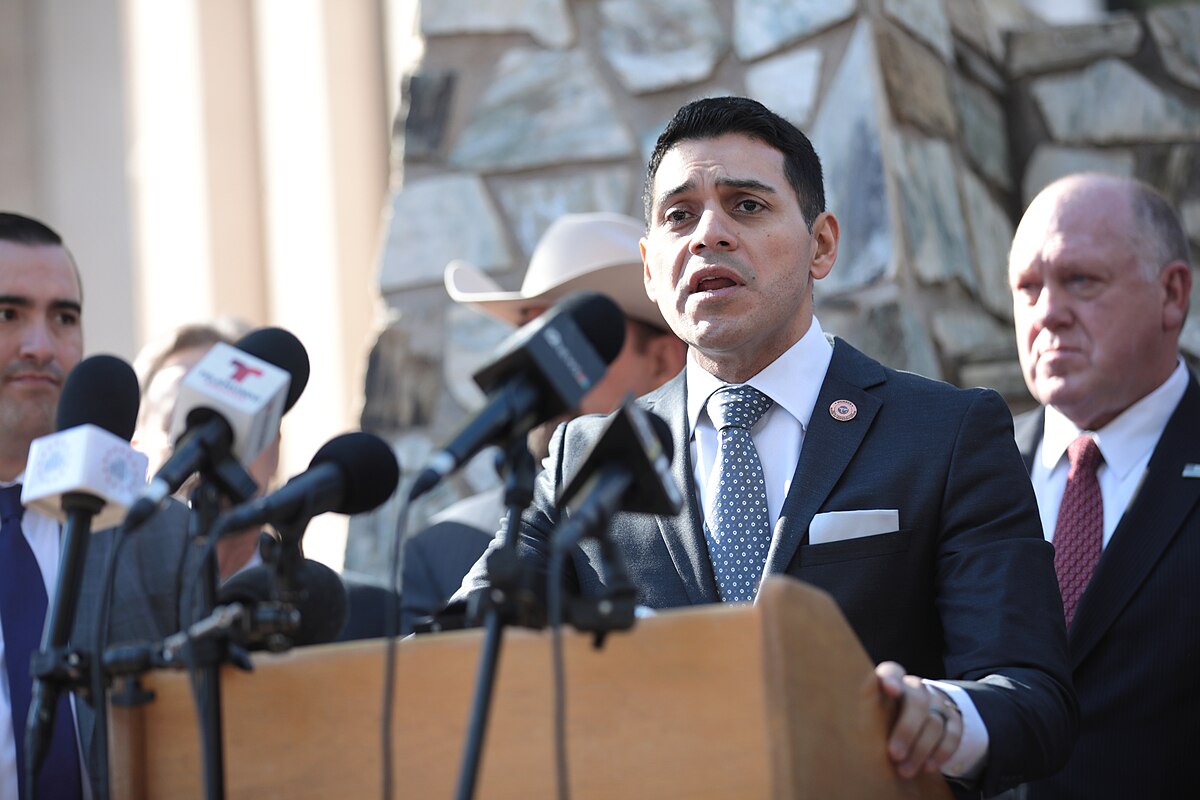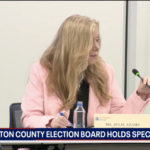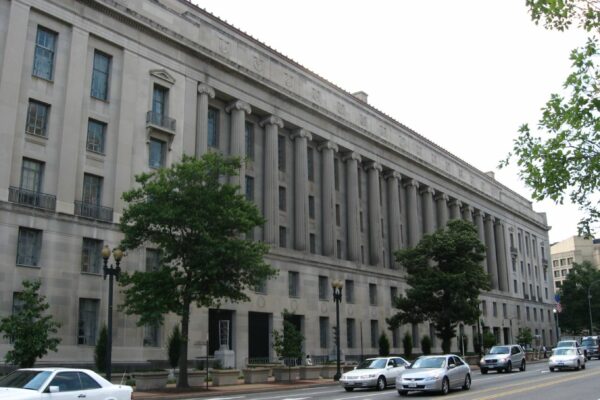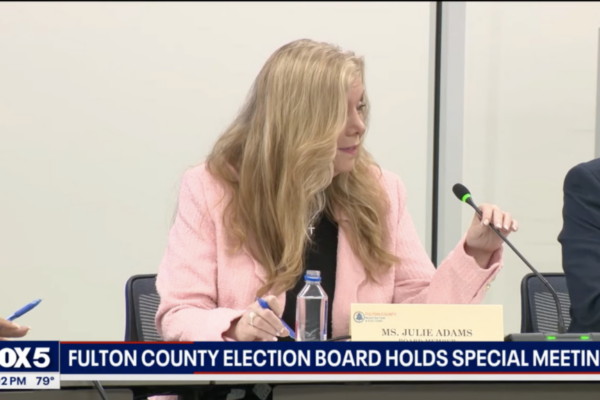Conservatives Fear Arizona House Committee Shakeup Could Stymie Election Integrity Bills

Arizona conservatives had much to celebrate after the dust finally settled on the 2024 election. Not only did voters deliver the Grand Canyon State’s 11 electoral votes to Donald Trump, but they also helped Republicans expand their slim legislative majorities, thus preventing Democrat Gov. Katie Hobbs and Arizona leftists from transforming the state into “California 2.0.”
Numerous policy issues are expected to be tackled during next year’s legislative session. It’s fixing the state’s broken elections system, however, that seems to be top of mind for many Republicans.
Last week, state and local GOP leaders held a call with Florida Secretary of State Cord Byrd to discuss ways Arizona can improve its ballot tabulation process and deliver timely results like the Sunshine State. Delayed production of election results has become a feature of Arizona elections in recent years. The state certified the results of its 2024 presidential election on Monday — almost three weeks after the Nov. 5 contest.
While supportive of attempts to adopt “Florida-style” elections, some Arizona conservatives who spoke with The Federalist expressed concern that a shakeup of the House of Representatives’ elections committee could hinder efforts to pass legislation integral to improving the state’s electoral system.
The list of House committees published last week by Speaker-elect Steve Montenegro revealed that the Municipal Oversight & Elections Committee is no more, with election-related matters now shoehorned into a committee alongside military affairs and federalism issues. State GOP Rep. Rachel Jones told The Federalist she’s worried that including the complex subject of elections into a committee with other important policy matters may jeopardize lawmakers and citizens’ ability to thoroughly screen bills coming through the body.
“Republicans are supposed to be the party of small government, so when we’re putting so many bills in there … it is harder to really vet them all. And even more importantly, it’s the people’s government [and] they should have the time to be able to vet all these bills too,” Jones said.
Existing Concerns
A member of the Municipal Oversight & Elections Committee, Jones noted how “a lot of Americans are still very concerned about elections and transparency in the process.” She referenced election administration problems in Pima County this cycle, in which local officials reported the wrong number of outstanding ballots awaiting tabulation.
“This is not just a Republican thing,” said Jones, a member of the Arizona Freedom Caucus. I recently had “a good conversation [with a Democrat colleague] about how … there’s a lot of people [who] don’t trust the election process.”
Jones — who is slated to vice chair the incoming Federalism, Military Affairs & Elections Committee — claimed she expressed “disappoint[ment]” about the election committee changes when speaking with Montenegro and that the speaker-elect “did not” give her a reason on why election issues “got shoved” into a committee also devoted to federalism and military affairs.
Strong Communities Foundation of Arizona (“EZAZ.org”) Chair Merissa Hamilton echoed the GOP representative’s concerns that cramming election matters into a committee focused on other subjects could hamper Republicans’ ability to advance good election measures. Speaking with The Federalist, she specifically noted that “stack[ing] a committee with a bunch of other topics” limits the amount of time bills and those speaking on them “can be heard.”
“When you limit the speakers that can be heard, now the legislators are less informed of the ramifications of the bill,” Hamilton said. “Whenever you don’t go through a regular order process, bad things [can] happen in the legislative process. Things are overlooked; language is rushed; the legislators aren’t fully informed [about] what they’re voting on; and the problems that could come from the bill, or the benefits that could come from the bill, aren’t fully flushed out.”
In a statement provided to The Federalist, Montenegro pushed back on concerns that including election-related matters alongside other topics in a single committee would stymie the legislature’s ability to advance election legislation. He noted, “Legislative committees often address multiple areas of policy.”
“In the House of Representatives, for example, the Elections Committee was paired with Municipal Oversight during the 56th Legislature, and with Government in prior sessions,” Montenegro said. “Both configurations successfully advanced critical election reforms. For comparison, the Senate’s Elections Committee will now be combined with Judiciary for the 57th Legislature.”
Referencing the Municipal Oversight & Elections Committee, Hamilton claimed that “municipalities don’t get that many bills at the legislative level,” and that the “big bulk” of the bills considered by the committee were election-related.
The Legislative Road Ahead
With the state’s 2025 legislative session fast approaching, Hamilton and Jones pointed to several areas of Arizona’s elections in need of improvement.
While referencing state and local GOP leaders’ call with Byrd, the EZAZ.org chair opined that “adopting a Florida-style model for elections … adds a lot of advantages” for Arizona — notably, that it would allow voters to “know within 12 hours of Election Day who won an election based on having 95 percent of the ballots counted.” Keeping noncitizens off the state’s voter rolls and fixing problems with the Motor Vehicle Division — “which is where most of the voter registrations come through” — are other priorities legislators should tackle next year, she added.
“These are all things that need to be dealt with legislatively, very urgently, and they’re also big, big pieces of work,” Hamilton said. “To not have that go through a separate elections committee is irresponsible and … a dereliction of duty … You cannot ‘Make America Great Again’ without securing our elections.”
Meanwhile, Jones revealed plans to push a bill she introduced last session that would implement precinct-based voting throughout the state. Localities such as Maricopa County currently have in place a vote center model, in which electors can cast their ballot at any voting location throughout the jurisdiction, regardless of their address. The vote center system’s problems garnered widespread criticism following Maricopa’s maladministered 2022 midterm elections.
Montenegro told The Federalist he is “actively collaborating with [the House’s] incoming committee chairs and caucus members to identify priorities,” and that House Republicans will “unveil [their] conservative majority plan” for the upcoming session “soon.” Addressing concerns about the new Federalism, Military Affairs & Elections Committee’s ability to advance “critical election reforms,” the speaker-elect praised incoming committee Chair and GOP Rep. John Gillette, who he said is “excited to continue advancing election reforms — which is an area of expertise and passion for him.”
Jones similarly praised Gillette, calling him a “really good man [and] representative” whom she “work[s] really well [with].”
“I think [we’re] gonna be a good combo, and hopefully we can get some good things done” this year, she said.
Shawn Fleetwood is a staff writer for The Federalist and a graduate of the University of Mary Washington. He previously served as a state content writer for Convention of States Action and his work has been featured in numerous outlets, including RealClearPolitics, RealClearHealth, and Conservative Review. Follow him on Twitter @ShawnFleetwood




